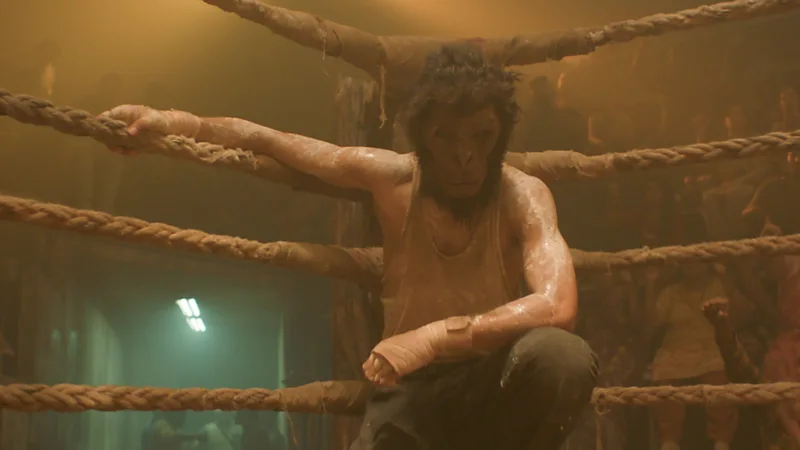In the heart of the bustling film industry, where stories are woven, narratives are crafted, and cultures collide, emerges a groundbreaking collaboration between two visionary creators. Dev Patel, known for his captivating performances across a spectrum of roles, and Jordan Peele, the mastermind behind genre-defying cinema, unveil their latest venture: Monkey Man. This action-packed thriller transcends boundaries, drawing inspiration from Hindu mythology, martial arts epics, and the raw realities of contemporary India.
A Journey of Inspiration:
Dev Patel, acclaimed for his roles in Slumdog Millionaire and Lion, steps into the directorial arena with Monkey Man. His vision marries the adrenaline-fueled allure of action cinema with a deep-rooted narrative steeped in Hindu mythology. Patel’s childhood fascination with cinematic legends like Bruce Lee and Shah Rukh Khan, coupled with tales of divine monkey Hanuman from his grandfather, forms the bedrock of this cinematic odyssey.
Mixing Mythology and Martial Arts:
At the core of Monkey Man lies the legend of Hanuman, a symbol of strength and courage in Hindu mythology. Patel ingeniously intertwines this mythical essence with the kinetic energy of martial arts, paying homage to cinematic influences ranging from Bruce Lee’s iconic prowess to the visceral intensity of Korean revenge cinema. The result is a cinematic tapestry that pulsates with authenticity and cultural resonance.
Challenging the Status Quo:
Beyond its adrenaline-pumping action sequences, Monkey Man ventures into the socio-political landscape of modern India. Patel’s narrative thread weaves through the fabric of caste systems, religious manipulation, and societal unrest, echoing the struggles of the marginalized. Through the character of Kid, portrayed with grit and determination by Patel himself, the film embarks on a journey of redemption and defiance against the entrenched powers that be.
A Voice for the Underdogs:
In a poignant reflection of his own journey, Patel imbues Monkey Man with themes of resilience, identity, and the relentless pursuit of justice. The character of Kid emerges as an emblem of the underdog, navigating through a labyrinth of adversity with unwavering resolve. Through his portrayal, Patel confronts the notion of pigeonholing in the film industry, championing stories that resonate with universal truths and aspirations.
The Jordan Peele Factor:
Enter Jordan Peele, the visionary director behind Get Out, whose discerning eye recognizes the transformative potential of Monkey Man. Peele’s endorsement adds a layer of validation to Patel’s directorial debut, elevating it from a mere action spectacle to a thought-provoking cinematic experience. His partnership with Patel underscores a shared commitment to pushing boundaries and defying convention.
A Global Discourse:
Monkey Man transcends geographical boundaries, offering a lens through which to examine universal issues. Patel’s storytelling prowess delves into the complexities of police corruption, gender identity, and societal upheaval, sparking conversations that resonate far beyond the confines of the screen. Through a meticulously crafted narrative, the film serves as a conduit for social commentary, challenging audiences to confront uncomfortable truths.
In the pulsating heartbeat of Monkey Man, Dev Patel and Jordan Peele have crafted more than a mere action-thriller; they have birthed a cultural phenomenon. Through a fusion of mythology, martial arts, and social realism, they invite audiences on a transformative journey that transcends genre conventions. As the cinematic landscape evolves, Monkey Man stands as a testament to the power of storytelling to provoke, inspire, and ignite change. In the hands of visionaries like Patel and Peele, the possibilities are boundless, offering a glimpse into a future where cinema becomes a mirror reflecting the tapestry of human experience.















